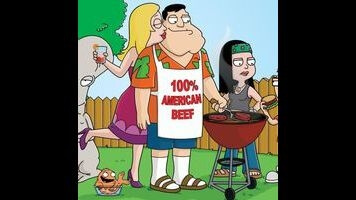Entering its 11th season and, as it completes its move from Fox to TBS, its second network, American Dad remains television’s finest purveyor of shock comedy. This is a show willing to do just about anything for a laugh, no matter how dark or disturbing the implications might be for its characters. Of the four humans, one alien, and one German-turned-goldfish who make up the central Smith family, at least half of them can casually commit murder without the show batting an eye. Indeed, as one recent episode makes clear, a willingness to kill anyone who is even slightly inconvenient extends well beyond the Smiths to even the apparently-normal supporting characters. American Dad will make jokes about statutory rape, alcoholism, environmental degradation, prostitution, and ethnic stereotypes—and that’s just from this batch of five episodes.
Still, all of that merely affirms American Dad’s use of shock humor, and that’s not remarkable in and of itself. Lots of terrible shows subsist on shock humor, including a disproportionate number of animated shows, perhaps because their creators assume audiences won’t invest emotionally in a cartoon character. The reason American Dad is different from such shows—a list that most notably includes its big brother, the fellow Seth MacFarlane creation Family Guy—is that it does care about the emotional reality of its characters. Not that this means the show cares about character continuity, because it doesn’t: The alien Roger notoriously shifts from disguise to disguise and persona to persona as the plot requires, while patriarch Stan Smith can be a trigger-happy lout one episode, an overbearing control freak the next episode, and a childlike buffoon in the one after that. Hell, that kind of variance in characterization can happen from scene to scene, particularly when Roger or Stan isn’t the main point of emphasis of the episode. This show exists on an entirely different part of the spectrum from a Bob’s Burgers or a King Of The Hill, where the consistent development of recurring character traits over the course of multiple seasons can sustain stories and drive jokes. Every week, American Dad more or less starts fresh.
But the crucial detail is that an episode will pick its chosen relationship to emphasize—to use a recent example, Roger and Stan fighting over whether the Smiths are too classless—and then take that relationship just seriously enough to give the story a narrative core. From there, American Dad can include as many joyously tasteless gags and unexpected non sequiturs—the show eschews Family Guy’s beloved cutaways, but the final Fox episode does pick up the strange, entirely tangential saga of the golden turd—without it feeling like the audience is just watching a bunch of joke delivery mechanisms shouting one-liners at each other, as can often happen on inferior animated shows. The more outrageous jokes work because Roger and Stan feel like actual characters, even if they aren’t the same characters they were 30 seconds ago, let alone a week ago.
MacFarlane deserves credit for the acting he brings to both characters. Roger is the showier of the two creations, but it might be more impressive that he manages to make Stan occasionally endearing instead of entirely obnoxious. In its writing, American Dad knows its own reality well enough that it understands when to pull back, when to dial down the harshness of a gag by having even a sociopath like Roger acknowledge its cruelty. This is the shock comedy equivalent of having one’s cake and eating it too, and it keeps American Dad accessible even to those who normally lack the stomach for such humor.
As the show makes its transition from 10 seasons on Fox to a new life on TBS, the big question is whether the move will somehow change American Dad’s finely balanced comedy machine, especially when a much bigger behind-the-scenes change—the departure of longtime co-showrunner Mike Barker, who reportedly left over creative differences—should make itself felt at some point later this year. The sample size is small, but there isn’t much difference between the final three Fox episodes and the first two TBS entries, although next week’s episode does rely more than the average American Dad episode on ethnic caricatures, and not in an especially funny or self-aware way. Still, one slightly weaker episode hardly constitutes a trend, and tonight’s TBS premiere is a fine outing, telling a story that’s theoretically about gender politics and environmentalism, through the most absurd lens possible. Also, Stan comes up with the most idiotic reason to want to move to a gated community, so that’s a plus.
As for the final three Fox episodes, only the last one betrays much of a sense that this is American Dad’s swan song on its original network. “Blagsnarst, A Love Story” encapsulates particularly well how the show can turn so many of its potential weaknesses into sneaky strengths. The episode features Kim Kardashian, a move that should feel like shameless stunt-casting, except she’s on hand to play a furry pink alien; this is in keeping with American Dad’s admirable habit of reeling in impressive guest voices and casting them in unrecognizable roles. The episode features Roger and Stan at their most casually sociopathic, yet both find just enough hidden emotional depth for the episode to not feel completely mean-spirited. And while the episode’s animation does feature a ton of the bland, proscenium-style staging, which places a lot of stress on the writing—compare this with, say, Bob’s Burgers, which uses a constantly moving “camera” to lend the characters dynamism and help sell jokes—American Dad is still capable of impressive animation when it wants to be, featuring gorgeous rolling vistas, big action sequences, and a seriously cinematic cutaway to that golden turd. That last bit epitomizes this show’s strange, wonderful appeal. It’s the nasty, shocking show with a genuine heart of gold(en turd). That sensibility should endure on any network.

 Keep scrolling for more great stories.
Keep scrolling for more great stories.
